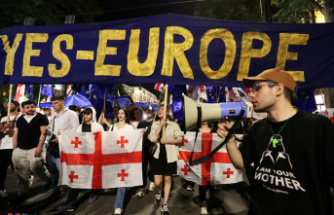Austrian Chancellor Karl Nehammer planned to question him about these statements, which he considered "naturally open to criticism".
Before this new controversy, the conservative official was delighted to welcome an "important neighbor and partner".
"Both countries are strongly affected by illegal migration, which we want to fight together," he wrote on Twitter, also referring to the subject of "energy cooperation" for these two countries very dependent on Russian gas.
This is Viktor Orban's first official visit to one of his European Union (EU) partners since his triumphant re-election in early April.
But the debates risk being dominated by the virulence of the speech held on Saturday by the 59-year-old Hungarian nationalist leader, accustomed to blows of brilliance.
"We don't want to be a mixed race", which would mix with "non-Europeans", he said, before making an apparent allusion to the gas chambers of the Nazi regime.
Holocaust survivors and the Hungarian Jewish community have condemned the "racist overtones" of such remarks, calling on the EU - and Karl Nehammer in particular - to "stand back".
Rare under the Orban era, Zsuzsa Hegedus, a sociologist advising him for a long time and whose parents survived the Holocaust, resigned on Tuesday. She denounced "a shameful position" and "a pure Nazi text worthy of (Joseph) Goebbels", in reference to the former head of Nazi Germany propaganda.
In an open letter, Mr. Orban defended himself by brandishing "his government's policy of zero tolerance when it comes to anti-Semitism and racism".
The European Commission declined to comment.
Without quoting Viktor Orban, only Vice-President Frans Timmermans reacted on Twitter on Wednesday, castigating racism, "a toxic political invention" which "should have no place in Europe".
According to several experts interviewed by AFP, the Hungarian Prime Minister's comments will probably "not have a domino effect either in Hungary or at EU level", where the release of stimulus funds is currently being negotiated. post Covid.
"His speeches have repeatedly caused scandals in the media and European political circles," said Bulcsu Hunyadi, of the think tank Political Capital, interviewed by AFP.
Mr. Orban "is seen as an isolated case", he adds, predicting "a low impact" on the discussions, even if "it could slow down the process".












